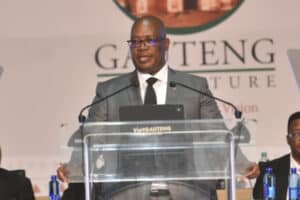Felix argued that name changes 'should be strategically administered not politically'.

Amid facing pockets of resistance, the Gauteng Geographic Names, Committee (GGNM) has reassured concerned communities of the inclusivity of the process to rename streets, buildings and the heritage landscape, with an expert maintaining that the cost of unifying a nation was – priceless.
According to Dr Mandla Mathebula, deputy chair of the 15-member GGNC – representative of all the district and metropolitan municipalities – the committee had a target of 12 name changes per financial year.
While conceding having encountered “pockets of resistance”, Mathebula reassured Gauteng residents of the fairness and inclusive approach of the process.
“We have had resistance in some parts of Tshwane, with some sectors of an area still aligning themselves with apartheid names – especially when it comes to parks, streets and buildings,” said Mathebula.
WATCH: ANC lobbies to support renaming of William Nicol Drive
“As a committee, we always push for thorough community consultation to achieve general happiness. We always try to address all people’s fears, with all proposed names covering all languages. We do not change a name simply because it is Afrikaans.”
Cost of renaming streets
Commenting on the name change approach adopted by the GGNM and cost implications, indigenous historian Dr Neville Felix said the costs were “a very relevant debate” but dependant on how they are measured.
“If you measure the cost, based on attaining social integration, cohesion, nation-building, then you won’t be able to put a figure to it, because it is priceless
“Maintaining the status quo becomes very costly, because the price you pay is not only on control but ownership. That is the underlying question many people don’t want to answer, because they have the fear that if things normalise, people may want to take your land or your car – something that has never happened,” he said.
Felix said changing the mindset is part of the problem.
“If you look at the genealogy, people are as mixed as everyone else, yet they want to be pure. They don’t understand the linguistic or cultural values – trying to enforce their own,” he said.
“The moment you come with change, some people think you are pinning your colours to the mast or forcing them to become African – not understanding that they are a hybrid of Africa.
“My view is that when it comes to the issue of geographical name changes, it becomes very critical that we realise that there is a spatial development planning process that has not been yet rectified – we still have a township being a township and a town being a town.
“You still find the majority of people without the means to move out of a township into the town – an area with better facilities.
“What influences the landscape change is the fact that you still have an unresolved process of a society that has not completely integrated or completely resolved their differences – something we need to recognise as the problem.”
Felix argued that name changes “should be strategically administered not politically”.
“For me, it is important that we keep that balance and try to facilitate a process that leaves a lasting legacy for future generations – an opportunity that geographical name changes can present,” added Felix.
“This can also help to achieve social cohesion by mending the differences between what we have experienced in our sordid past – also something that can work as part of the healing process, because of what had happened.
ALSO READ: Renaming SA’s cities is about regaining status
“You may change some names after five comrades and when a new administration comes in, the same names are again changed – a start a rhetorical process that does not resolve the issue.”
He said he was of the opinion that the best way to resolve this was to do proper due diligence on a geographical layout of an area.
“Consider the most important factors of that area.
“In Cape, you have Table Mountain – a serious characterisation of an area.
“Our processes should also take note of animals that are very unique to your province, including butterflies and ants – only found in a certain area.”
Support Local Journalism
Add The Citizen as a Preferred Source on Google and follow us on Google News to see more of our trusted reporting in Google News and Top Stories.






